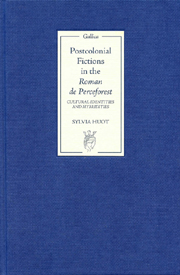Book contents
- Frontmatter
- Contents
- Acknowledgements
- Introduction
- PART I Founding Myths: Nature, Culture, and the Production of a British Kingdom
- 1 First Encounters: Gadifer in the Deserts d'Escoce
- 2 Testing Boundaries: Colonial Culture and Indigenous Nature
- 3 The King, His Law, and His Kingdom
- PART II Heteronormative Sexuality and the Mission Civilisatrice
- PART III Greeks, Trojans, and the Construction of British History
- Conclusion
- Glossary of Proper Names in Perceforest
- Bibliography
- Index
1 - First Encounters: Gadifer in the Deserts d'Escoce
from PART I - Founding Myths: Nature, Culture, and the Production of a British Kingdom
Published online by Cambridge University Press: 05 February 2013
- Frontmatter
- Contents
- Acknowledgements
- Introduction
- PART I Founding Myths: Nature, Culture, and the Production of a British Kingdom
- 1 First Encounters: Gadifer in the Deserts d'Escoce
- 2 Testing Boundaries: Colonial Culture and Indigenous Nature
- 3 The King, His Law, and His Kingdom
- PART II Heteronormative Sexuality and the Mission Civilisatrice
- PART III Greeks, Trojans, and the Construction of British History
- Conclusion
- Glossary of Proper Names in Perceforest
- Bibliography
- Index
Summary
Book II of Perceforest opens with a cross-cultural encounter that encapsulates many of the anthropological and historiographic themes of the text as a whole. Gadifer, now king of Scotland, decides to explore his kingdom. And although his entourage does include some very capable Scottish knights, he finds that much of Scotland is a sparsely inhabited wilderness. In the Deserts d'Escoce – the Scottish Wilds, probably corresponding to the Highlands – there are no towns at all, just simple cowherds living in makeshift huts. Gadifer's encounter with these Scottish ‘savages’ is a classic mise en scène of Western notions of colonialism as a mission civilisatrice.
This fictional account of a ‘first contact’ – or at least, the first contact that the inhabitants of the Scottish Wilds have had with civilisation since their ancestors, fleeing the fall of Troy, washed ashore a few generations earlier – describes an uncivilised yet highly malleable, indeed grateful, people. Initially terrified, they mistake the new arrivals for devils; the men cower in the bushes while the women rush forward in a savage attack. But once they realise that these strange, armourclad creatures are people, they quickly accept the sovereignty of the king, eager for the blessings of civilisation. The reader, presumed to be a member of medieval court culture, thus sees the knights from the outside while simultaneously identifying with them: ‘we’ become ‘other’, but a glorious other. And Gadifer's subjugation of the people is an act of beneficence, less an imposition than a restoration of their lost Trojan heritage.
- Type
- Chapter
- Information
- Postcolonial Fictions in the 'Roman de Perceforest'Cultural Identities and Hybridities, pp. 25 - 43Publisher: Boydell & BrewerPrint publication year: 2007



